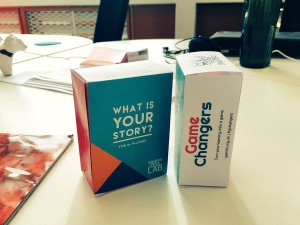Author: Helen Keegan 10th August 2016
The Game Changers initiative was established in 2015 as a DMLL ‘meta-project’ for the development of playful and gameful pedagogies. The fundamental goal is for learners to develop their own games; learning through designing. This entails a cultural shift from game provision to production, empowering learners using open and connected approaches to game design, influenced by design sprints and design thinking. Game Changers aims to develop new learning cultures around playful approaches to learning and demystify the process of game design and development which is often seen as something strictly hi-tech based and therefore hardly accessible to many learners and teachers.
Game Changers emphasises meaningful and purposeful play; technology-enhanced rather than technology-led. Game Changers is simultaneously a community of interest, and open course, a pedagogical model, and a fablab-style makerspace. Through providing staff and students with toolkits and frameworks for designing and implementing playful learning experiences, Game Changers promotes the emergence of a more playful, creative culture in everyday contexts.
Sample Game Changers initiatives include:
Adaptable Game Design Thinking programme: A programme that includes 4 key stages based on a holistic design approach developed by Sylvester Arnab at the DMLL. This programme can be embedded as part of a module to facilitate a game design process to complement tutorial sessions/assignments/etc. E.g. Students can go through a game design process as part of a dissertation/assignments.

Card-based approach to facilitate team learning: the development of card-based games, such as the ‘What’s your story?’ card deck uses Experience Design to help students and staff to be creative in their interpretation of abstract concepts. “What’s Your Story” is being used as far afield as China (through HLS flying faculty) and New York (Revolutionary Learning)!
Role-play and narratives: such as the Escape Room influenced EscapED, developed by Samantha Clarke, which emphasises problem-solving and active exploration. The DMLL EscapED experience has really captured people’s imagination, and along with developing experiences for CU faculties, we’ll be running the first conference Escape Room at Online Educa Berlin 2016!
Paper-based non-linear narratives and problem solving: a creative approach to develop reusable templates for non-linear narratives to be used for teaching and learning various subjects. The Flipped-in-a-box toolkit has been developed and piloted across the university.
Workshops and fablabs: using a design sprint methodology, the Game Changers team are working with faculties to develop core skills in collaborative and interactive games design, allowing staff and students to develop blueprints for their own gameful and/or playful learning experiences.
Exciting upcoming developments include a year long game trial starting in September 2016 (TOP SECRET), Game Changers workshops and toolkits embedded across CU, and the Game Changers developing Lego Serious Play workshops to all faculties in 2016-17!
